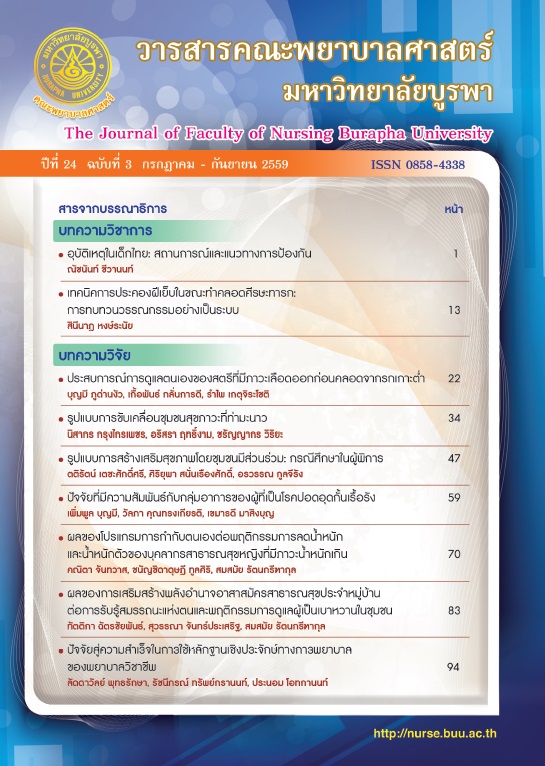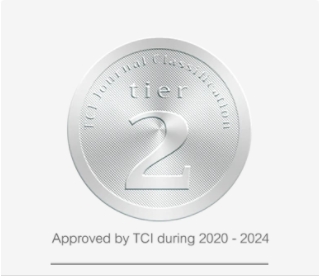ผลของโปรแกรมการกำกับตนเองต่อพฤติกรรมการลดน้ำหนักและน้ำหนักตัว ของบุคลากรสาธารณสุขหญิงที่มีภาวะน้ำหนักเกิน
คำสำคัญ:
โปรแกรมการกำกับตนเอง, พฤติกรรมการลดน้ำหนัก, น้ำหนักตัว, บุคลากรสาธารณสุข, หญิงที่มีภาวะน้ำหนักเกิน, Self-regulation program, weight loss behavior, bodyweight, overweight female health care personnelบทคัดย่อ
บทคัดย่อ
การศึกษาครั้งนี้มีวัตถุประสงค์เพื่อศึกษาผลของโปรแกรมการกำกับตนเองต่อพฤติกรรมการลดน้ำหนักและน้ำหนักตัวของบุคลากรสาธารณสุขหญิงที่มีภาวะน้ำหนักเกิน กลุ่มตัวอย่างได้แก่บุคลากรสาธารณสุขหญิง ที่ปฏิบัติงานในสถานบริการสาธารณสุข เขตเทศบาล จังหวัดสระบุรี จำนวน 60 คน ซึ่งได้มาจากการสุ่มอย่างง่าย แบ่งเป็นกลุ่มทดลองและกลุ่มควบคุม กลุ่มละ 30 คน โดยกลุ่มทดลองได้รับโปรแกรมการกำกับพฤติกรรมการลดน้ำหนักของตนเอง ส่วนกลุ่มควบคุมได้รับความรู้ในการปฏิบัติตนจากพยาบาลตามปกติ เครื่องมือที่ใช้ในการทดลองประกอบด้วย โปรแกรมการกำกับตนเอง คู่มือให้ความรู้เรื่องภาวะน้ำหนักเกิน แบบบันทึกการกำกับตนเอง และเครื่องชั่งน้ำหนัก เครื่องมือที่ใช้ในการเก็บรวบรวมข้อมูลประกอบด้วยแบบสอบถามข้อมูลส่วนบุคคล แบบสอบถามพฤติกรรมการบริโภคอาหาร แบบสอบถามพฤติกรรมการออกกำลังกาย และแบบสอบถามพฤติกรรมการควบคุมอารมณ์ ซึ่งมีค่าสัมประสิทธิ์อัลฟ่าของครอนบาคเท่ากับ .70, .71 และ .70 ตามลำดับ วิเคราะห์ข้อมูลโดยใช้สถิติสถิติพรรณนา และสถิติที
ผลการวิจัยพบว่าภายหลังการทดลอง กลุ่มทดลองมีค่าเฉลี่ยผลต่างคะแนนพฤติกรรมการบริโภคอาหาร พฤติกรรมการออกกำลังกาย พฤติกรรมการควบคุมอารมณ์ และค่าเฉลี่ยผลต่างน้ำหนักตัว มากกว่ากลุ่มควบคุมอย่างมีนัยสำคัญทางสถิติ (t = 10.84, p < .001; t =12.03, p < .001; t = 7.99, p < .001 และ t = - 11.80, p < .001 ตามลำดับ) จากผลการวิจัยมีข้อเสนอแนะว่า พยาบาลที่ปฏิบัติงานในหน่วยบริการระดับปฐมภูมิสามารถนำโปรแกรมนี้ไปประยุกต์ใช้เป็นแนวทางในการปรับพฤติกรรมบริโภคอาหาร การออกกำลังกาย และการควบคุมอารมณ์ เพื่อลดน้ำหนักผู้ที่มีภาวะน้ำหนักเกินได้
Abstract
The purpose of this research was to study the effects of self-regulation program on weight loss behavior and bodyweight among overweight female health care personnel. A simple random sampling method was used to recruit the sample of 60 following the inclusion criteria and was randomly assigned into an experimental group and a control group of 30. The experimental group received the self-regulation weight control program, whereas the control group received the routine services from the hospital. Research instruments included the self-regulation weight control program, a handbook for overweight education, a self-regulation record form, a demographic questionnaire, eating, exercise and emotional control behavior questionnaires with Cronbach’s alpha coefficient .70, .71, and .70 respectively. Data were analyzed by using descriptive statistics and Independent t-test.
The results revealed that at the end of the program, the experimental group had significantly higher mean difference scores of eating behavior, exercise behavior, emotional control behavior and mean difference of bodyweight than those of the control group at the level of .05 (t = 10.84, p < .001; t =12.03, p < .001; t = 7.99, p < .001 and t = -11.80, p < .001 respectively). The findings suggest that nurses and health professionals should use this self-regulation weight control program in order to enhance eating behavior, exercise behavior, and emotional control behavior to reduce weight among overweight people.





